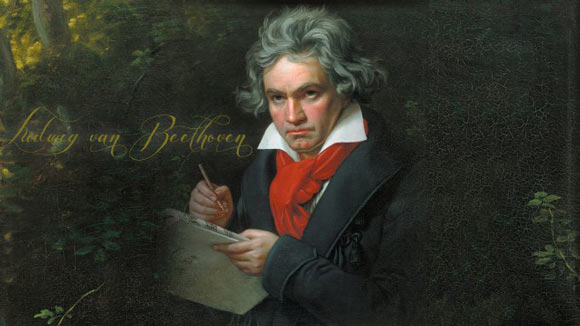This website uses marketing and tracking technologies. Opting out of this will opt you out of all cookies, except for those needed to run the website. Note that some products may not work as well without tracking cookies.
Opt Out of Cookies|
By Lindsay Perigo
[published with permission from solopassion.com] All right, 2019 isn't over yet, but nothing will beat this anywhere in the world: the New Zealand Symphony Orchestra's Beethoven Festival, featuring all nine symphonies by The Master. It ended in Wellington last Saturday. An orgy of joy. No contest. Of course, the Ode to Joy, with the added attraction of vocal soloists and chorus, was the highlight—apart from all the others. Seven, Five, Three and One might have taken the cake—except that Two, Four, Six (especially) and Eight took it as well. These were four nights of epic heroism and grandeur as the great Edo de Waart soared through some of the most sublime music ever written. The Band responded with exquisite precision and passion. "The total passion for the total height" writ large. The audiences responded with clamorous standing ovations. Harold C. Schonberg wrote of Beethoven: He was of a special breed and he knew it. He also knew he was writing for eternity. And he had what poor Mozart lacked—a powerful personality that awed all who came in contact with him. "Never have I met an artist of such spiritual concentration and intensity," Goethe wrote, "such vitality and great-heartedness. I can well understand how hard he must find it to adapt to the world and its ways." Little did Goethe understand Beethoven. With Beethoven it was not a matter of adapting himself to the world and its ways. As with Wagner later on, it was a matter of the world adapting its ways to him. With this high-voltage personality, coupled to an equally high-voltage order of genius, Beethoven was able to dictate to life on his own terms in almost everything except his tragic deafness. But life was having a lot to say as well. In her excellent notes for the Festival's printed programme, Feby Idrus observes: Change is not created in a vacuum, and Beethoven's rupture of the conventional symphony occurred during a time of global upheaval. The year was 1801. The Age of Enlightenment had dawned, preaching values of rationality, freedom, and rejecting established institutions, even literally, as the overthrown French monarchy learned in the Revolution.America had followed suit, violently throwing off the British colonising yoke in its own Revolution. Science was gaining ground over irrational religious dogma; the untitled middle classes were growing. Eight years earlier, Beethoven had moved from Bonn to his new home, Vienna—far away from his abusive, alcoholic father. The past was being left behind and the world was rushing towards a completely new future. Musically, that future was Romanticism. Bigger orchestras with more instruments, more daring harmonies and rhythms, much more personal expression and individualism, virtuoso soloists, conductors as stars (and tyrants!), the unleashing of emotion ... and most of all, melodies! Tunes, tunes, tunes! Beethoven was part of and instrumental in all of that, especially from the Eroica Symphony on, yet it's hard to classify him as a Romantic only. Romanticism was indeed the pinnacle of Western Music, but Beethoven transcended even that. It's not just a complimentary cliche but a statement of fact to say that his music was quite simply in a class of its own. If there were a marginal quibble to be had with respect to the grand finale last Saturday night it would probably be to do with the placement of the soloists between the choir and The Band. The balance may have been fine in the live radio broadcast but in the hall the soloists were swamped whenever the full force of The Band and the formidable Voices New Zealand was unleashed. Would Stage Front have been better? Regardless, soprano Sabina Cvilak managed to stand out in the general melee. As noted, the Ode to Joy was the logical and perfect climax to what were four evenings of unadulterated joy, with the unimpeachably vital and great-hearted Edo de Waart as our joy-master. It is great news that he'll be staying on as Conductor Laureate next year and beyond. In one of the comments on the performance of the Pastoral linked to below, a YouTuber writes: We don't know what the future holds but for certain Beethoven will be played for as long as human civilisation lasts. He is a high point of human creativity and a genius with no equal. With the aforementioned Enlightenment values of rationality, freedom and the pursuit of joy under relentless assault, we should savour memories of this Beethoven Fest as being very probably the last time anything like it will ever happen in New Zealand. The joyless barbarians are already well within the gates, here and elsewhere. But be assured that when civilisation falls, someone somewhere will indeed be playing some Beethoven, in a spirit of defiance the Emperor Ludwig would share and applaud. In the meantime, one can savour The Band this Friday at the Fowler Centre (and over the following week in Auckland, Christchurch and Dunedin) as they offer up this mouth-watering programme: Asher Fisch Conductor Louis Lortie Piano Rachmaninov Piano Concerto No. 2 in C minor, Op. 18 Richard Strauss Tod und Verklärung, Op. 24 (Death and Transfiguration) Wagner Overture to Tannhäuser, WWV 70 https://www.nzso.co.nz/concert...
0 Comments
Leave a Reply. |
Reality Check Radio: Six Hit Shows in One Week on the Assassination Attempt on Trump. NZ is Engaged!
Post Archives
July 2024
Links to Other Blogs |

 RSS Feed
RSS Feed